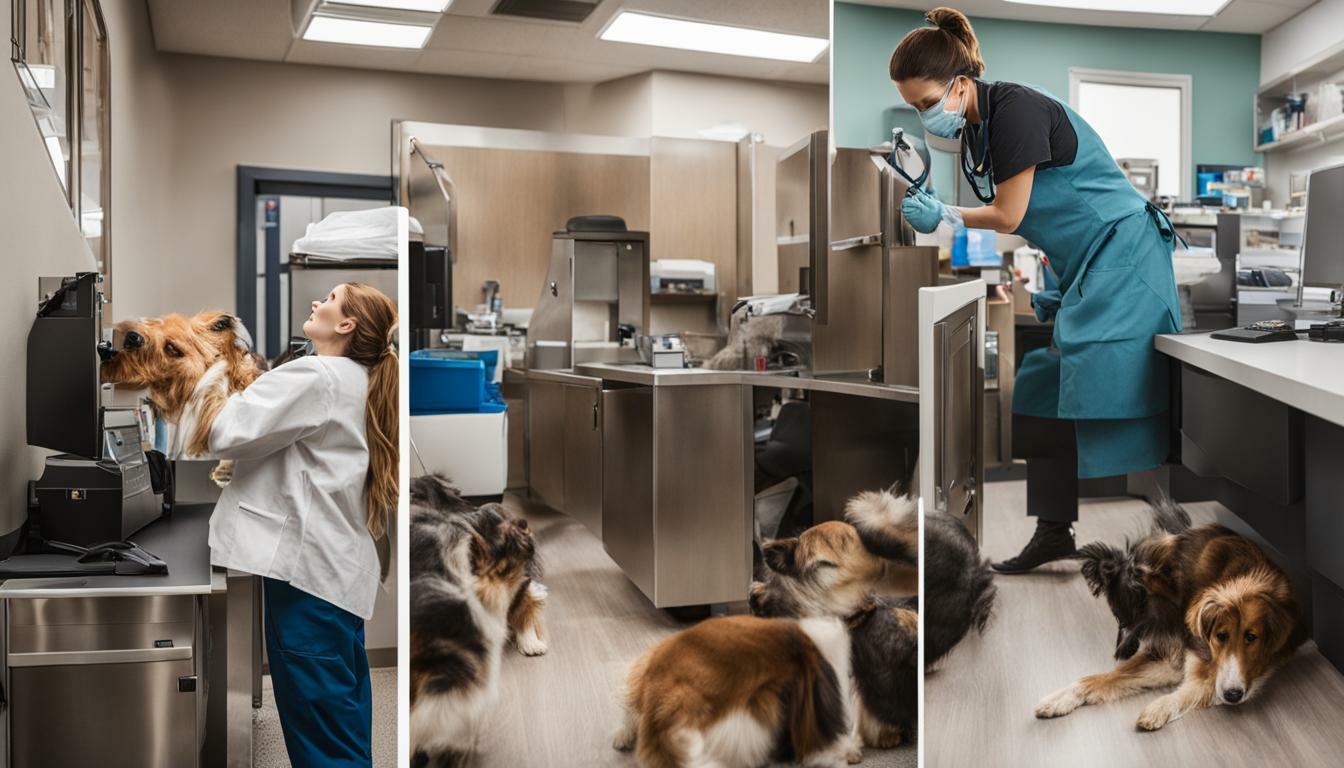
Being a veterinarian comes with its own set of advantages and disadvantages, which are important to consider before embarking on a career in animal healthcare. As a veterinarian myself, I have experienced firsthand the rewards and challenges that come with this profession. In this article, I will provide an honest and insightful overview of the pros and cons of being a veterinarian, shedding light on the advantages and disadvantages of working in the field of veterinary medicine.
- Veterinarians enjoy a good salary, work-life balance, and the opportunity to work with a variety of animals.
- Becoming a veterinarian requires extensive training and can lead to significant student loan debt.
- Working with animals, especially those that are sick or injured, can be emotionally demanding.
- Effective work-life integration is crucial for veterinarians to prevent burnout and prioritize self-care.
- Specialization within the field of veterinary medicine offers unique advantages but may have limitations.
The Benefits of Being a Veterinarian
There are several benefits that come with being a veterinarian, making it an appealing career choice for animal lovers. One of the major advantages is the financial rewards. Veterinarians can earn a good salary, with the average annual income ranging from $90,000 to $100,000. Some specialists in the field can even earn more. This provides a comfortable living and financial stability.
Another benefit is the flexibility in work-life balance. Veterinarians have the opportunity to work a traditional forty-hour week, allowing them to have time for their personal lives and interests. This flexibility is especially important for those who have families or other commitments outside of work.
Additionally, being a veterinarian offers the opportunity to work with a variety of animals. From small domestic pets to large exotic species, veterinarians get to interact and care for a diverse range of animals. This makes the job interesting and fulfilling, as every day brings new challenges and experiences.

Despite the benefits, it is important to acknowledge the drawbacks of being a veterinarian as well. This includes the extensive training required to become a licensed veterinarian, which usually takes at least eight years of education. This can be a significant time commitment and financial investment, as veterinary school can be expensive and often leaves graduates with substantial student loan debt.
Furthermore, working with animals, especially those that are sick or injured, can be emotionally demanding. It requires veterinarians to have compassion, patience, and the ability to handle difficult situations. It is essential for veterinarians to prioritize self-care and manage their work-life integration effectively to prevent burnout.
In conclusion, being a veterinarian has both its advantages and disadvantages. The financial rewards, work-life balance, and the opportunity to work with a variety of animals make it an appealing career choice for many. However, the extensive training, potential debt, and emotional challenges should also be considered. Ultimately, it is a profession that requires dedication, passion, and a genuine love for animals.
The Drawbacks of Being a Veterinarian
While being a veterinarian has its perks, it also comes with its fair share of challenges and drawbacks that should not be overlooked. One of the main drawbacks is the extensive training required to become a veterinarian. It takes at least eight years of education, including four years of undergraduate studies and four years of veterinary school. This not only requires a significant time commitment but also comes with a hefty price tag. Many aspiring veterinarians graduate with substantial student loan debt, which can take years to pay off.
Another challenge veterinarians face is the emotional toll of working with sick or injured animals. It can be heartbreaking to witness the suffering of animals and make difficult decisions regarding their treatment. This emotional strain can lead to burnout and compassion fatigue, which can have negative effects on a veterinarian’s mental health.
Furthermore, working with animals, especially those that are difficult or aggressive, can be physically demanding and sometimes dangerous. Veterinarians often have to handle large or aggressive animals, putting themselves at risk of injury. Additionally, they may be exposed to zoonotic diseases, which are infections that can be transmitted from animals to humans. This requires veterinarians to take precautions and maintain a high level of hygiene and safety.
To effectively manage the challenges of being a veterinarian, it is crucial to prioritize work-life balance. This profession can be demanding, with long hours and unpredictable schedules. However, veterinarians also have the flexibility to work a traditional forty-hour week and have the opportunity to specialize in different areas of veterinary medicine. By setting boundaries, practicing self-care, and seeking support when needed, veterinarians can navigate the demands of their profession while maintaining their well-being.
In conclusion, while being a veterinarian offers many benefits, such as a good salary and the opportunity to work with animals, it also comes with its drawbacks. The extensive training, potential debt, emotional toll, and physical demands can present challenges for those in the veterinary field. However, with proper self-care and a balanced approach to work and life, veterinarians can overcome these challenges and find fulfillment in their chosen profession.

| Pros | Cons |
|---|---|
| Good salary | Extensive training |
| Work-life balance | Potential debt |
| Opportunity to work with a variety of animals | Emotional toll of working with sick or injured animals |
| Physically demanding and sometimes dangerous |
Veterinary Career Advantages and Disadvantages
A career in veterinary medicine offers unique advantages and disadvantages that can shape a veterinarian’s professional journey. On one hand, veterinarians have the opportunity to make a positive impact on the lives of animals and their owners. They get to work with a variety of species and experience the joy of healing and saving lives. Additionally, the financial rewards can be significant, with veterinarians earning an average salary between $90,000 and $100,000 per year. Some specialists in high-demand areas can even earn higher incomes.
However, there are also challenges and drawbacks to consider. Becoming a veterinarian requires a significant investment in education and training. Prospective veterinarians typically need to complete a bachelor’s degree followed by four years of veterinary school. This can result in substantial student loan debt, which may take years to pay off. Furthermore, the job itself can be emotionally demanding, as veterinarians often have to make difficult decisions about euthanasia and deal with the grief of pet owners.
Table: 
Despite the challenges, veterinary medicine offers a fulfilling and rewarding career for those passionate about animals. Vet professionals have the flexibility to work in different settings, such as private clinics, research facilities, zoos, or even the military. They can specialize in specific areas such as surgery, dentistry, or exotic animals, allowing for continuous growth and development in their field. While the job can be demanding, managing work-life integration effectively is key to preventing burnout and prioritizing self-care. Overall, a career in veterinary medicine can be an incredibly fulfilling path for individuals who are dedicated to the well-being of animals.
Balancing Work and Life as a Veterinarian
Maintaining a healthy work-life balance is essential for veterinarians, but it can be challenging given the demands of the profession. As a veterinarian, I have experienced firsthand the perks and challenges of this career. On one hand, the opportunity to work with animals and make a positive impact on their lives is incredibly rewarding. On the other hand, the long hours, emotional toll, and potential for burnout can take a toll on one’s personal life.
One of the perks of being a veterinarian is the flexibility to work a traditional forty-hour week. This allows for more free time to pursue personal interests and spend time with family and friends. Additionally, veterinarians have the opportunity to specialize in different areas of veterinary medicine, such as surgery or dermatology. This specialization not only provides a sense of fulfillment but also opens up new career opportunities and potentially higher earning potential.
The joy of seeing a sick or injured animal recover and the gratitude from their owners is immeasurable.
However, it’s important to acknowledge the challenges that come with being a veterinarian. The extensive training and education required, typically eight years or more, can lead to significant student loan debt. This financial burden, coupled with the pressure to provide the best care for animals, can cause stress and anxiety.
Working with animals, especially those that are sick or injured, can be emotionally demanding and sometimes dangerous. It requires both physical and mental strength to handle difficult cases and make tough decisions. It’s crucial for veterinarians to prioritize self-care and seek support when needed to prevent burnout.
Overall, being a veterinarian has its perks and challenges. While the opportunity to work with animals and make a difference is fulfilling, it’s important to find a balance between work and personal life. By managing time effectively, seeking support, and prioritizing self-care, veterinarians can navigate the challenges of the profession and lead a fulfilling and rewarding career.

Managing Veterinary Student Debt
Student loan debt is a significant concern for many aspiring veterinarians, and understanding how to navigate this financial challenge is crucial. While the rewards of a career in veterinary medicine are numerous, the cost of education can often leave graduates with substantial debt. It is important for prospective veterinarians to be aware of the benefits and drawbacks of choosing a career in veterinary science, including the financial implications.
One way to manage student loan debt is to explore scholarship opportunities specifically for veterinary students. There are various organizations, foundations, and associations that offer scholarships to help alleviate the financial burden of education. Researching and applying for scholarships can significantly reduce the amount of debt incurred during veterinary school.
Additionally, veterinarians can consider income-driven repayment plans, which adjust monthly loan payments based on their income and family size. These plans can make loan repayment more manageable by providing affordable payment options. It is important to explore these repayment plans and choose the one that best fits individual circumstances.
| Pros of Managing Veterinary Student Debt | Cons of Managing Veterinary Student Debt |
|---|---|
|
|
The key is to be proactive in managing student loan debt, starting with careful financial planning before entering veterinary school. By exploring scholarship opportunities, considering income-driven repayment plans, and practicing responsible financial habits, veterinarians can effectively manage their student debt and enjoy a fulfilling career in veterinary medicine.

The field of veterinary medicine presents unique challenges that require veterinarians to navigate complex medical cases, ethical decisions, and emotional strain. Working with animals, especially those that are sick or injured, can be emotionally demanding and sometimes dangerous. It is important for veterinarians to manage their work-life integration effectively to prevent burnout and prioritize self-care.
One of the key challenges in veterinary medicine is the need to make difficult medical decisions. Animals cannot communicate their symptoms or medical history, which often makes diagnosis and treatment challenging. Veterinarians must rely on their knowledge, experience, and intuition to provide the best possible care for their patients. This can be particularly challenging when dealing with complex cases or cases where the outcome is uncertain. It requires veterinarians to constantly update their knowledge and skills to stay at the forefront of veterinary medicine.
Additionally, veterinarians often face ethical dilemmas in their practice. They must make decisions about euthanasia, experimental treatments, and the welfare of animals. These ethical decisions can be emotionally taxing and require veterinarians to carefully consider the best interests of the animal, their clients, and society as a whole. It is important for veterinarians to have a strong moral compass and be able to communicate and explain their decisions to clients and colleagues.
Furthermore, the emotional strain of working with sick or injured animals can take a toll on veterinarians. They often form strong bonds with their patients and their clients, which can make it difficult to handle cases with poor outcomes or to deliver difficult news. Veterinarians must learn to cope with the emotional impact of their work while maintaining professionalism and providing the necessary care and support for their patients and clients.
Effective Strategies for Overcoming Challenges
To overcome the challenges in veterinary medicine, veterinarians can adopt various strategies:
- Seek support from colleagues: Sharing experiences and seeking advice from colleagues can help veterinarians navigate challenging cases and ethical dilemmas.
- Practice self-care: Taking care of one’s physical and mental well-being is crucial in managing the emotional strain of veterinary medicine. Engaging in activities outside of work, seeking therapy or counseling, and maintaining a healthy work-life balance are essential.
- Continuing education: Staying up-to-date with the latest advancements in veterinary medicine can enhance diagnostic and treatment abilities, making it easier to overcome difficult cases.
- Effective communication: Developing strong communication skills is important for discussing challenging cases with clients and colleagues, as well as delivering difficult news with empathy and compassion.
By implementing these strategies, veterinarians can navigate the challenges inherent in their profession and continue to provide the best possible care for their animal patients.
| Pros | Cons |
|---|---|
| Good salary | Lengthy training |
| Work-life balance | Potential debt |
| Opportunity to work with a variety of animals | Challenges of working with difficult animals |

“The love for all living creatures is the most noble attribute of man.” – Charles Darwin
Conclusion
Being a veterinarian has its advantages and disadvantages, and it is important for individuals considering this profession to carefully evaluate both sides before making a decision. On the positive side, veterinarians can enjoy a good salary and have the opportunity to work with a wide variety of animals, which can be both rewarding and fulfilling. Specializing in different areas of veterinary medicine also allows them to explore their interests and develop expertise in specific animal species or conditions.
However, it’s important to note that becoming a veterinarian requires a significant investment in time and education. With at least eight years of training, including undergraduate studies and veterinary school, aspiring veterinarians must be prepared for the rigorous academic journey ahead. In addition, the cost of education can result in substantial student loan debt, which may take years to pay off.
Working with animals, especially those that are sick or injured, can be emotionally demanding. Veterinarians must cope with the challenges and heartbreak of seeing animals in pain or needing to make difficult decisions regarding their care. Moreover, there can also be physical risks associated with handling certain animals, such as wildlife or large, aggressive pets.
Despite these challenges, many veterinarians find a sense of fulfillment in their work and are deeply passionate about improving the health and well-being of animals. However, it’s crucial for veterinarians to prioritize their own well-being and manage their work-life integration effectively. This includes maintaining a healthy work-life balance, seeking support when needed, and practicing self-care to prevent burnout.
FAQ
What is the average salary of a veterinarian?
Veterinarians can earn between $90,000 and $100,000 per year, with some specialists earning even more.
What is the work-life balance like for veterinarians?
Veterinarians have the flexibility to work a traditional forty-hour week and can prioritize their work-life balance.
What opportunities are there for specialization in veterinary medicine?
Veterinarians can choose to specialize in different areas of veterinary medicine, allowing them to focus on specific animal species or medical conditions.
How long does it take to become a veterinarian?
Becoming a veterinarian requires at least eight years of training, including undergraduate studies and veterinary school.
What are the potential challenges of being a veterinarian?
Working with animals, especially those that are sick or injured, can be emotionally demanding and sometimes dangerous.
How can veterinarians manage their work-life integration effectively?
Veterinarians need to prioritize self-care and implement strategies to prevent burnout, such as setting boundaries and seeking support.
Is student loan debt a common issue for veterinarians?
Yes, many veterinarians graduate with significant student loan debt due to the extensive training required.
What are some of the challenges veterinarians may face in their careers?
Veterinarians may encounter difficult cases, ethical dilemmas, and the emotional toll of working with animals in distress.



